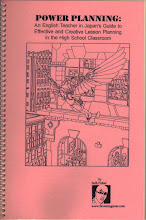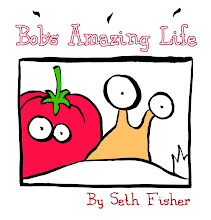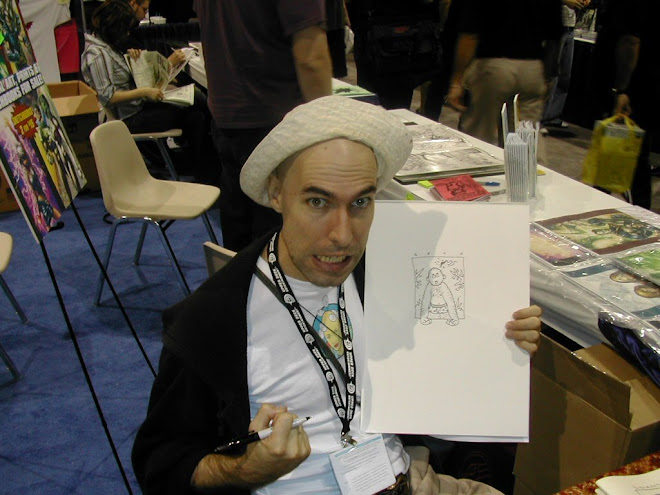His answers tell a lot about the way he approached art as well as life.
Q: Elaborate a bit on how math relates to your art/life.
[Seth was a math major.]
Seth: For one thing, a math background allows you to separate people's suppositions from their conclusions. Someone says, "Rastall [one of the dorms, with its own dining hall] is too food heavy. the potato gratin gives me gas." You think, "No way, that wasn't a rigorous proof at all. The salad bar is totally gentle on the lower intestine. You haven't taken a representative sample of the cuisine." You can't argue with someone's flatulence, but you can use their experience to draw your own conclusions. I can avoid the gratin without making assumptions about the other entrees. Learning math is like putting on a whole new set of glasses. You see advertisements for toothpaste, and you go, "Hey, that supermodels's cleavage has nothing to do with oral hygiene." It helps you to correct logical inconsistencies in your thinking. Then you can begin to prove the real parameters involved in keeping your teeth clean.
Art and comics are mathematical sciences as far as I'm concerned. Perspective, composition, timing, and color theory are technical skills. The opposite is also true. Raw mathematics is creative and artistic to me. You have a problem, and you have this toolbox full of techniques that you use to paint a totally unique bridge from an assumption to its implications. At first you're forced to learn all these techniques that seem very rigid, but when you understand them you can apply them creatively. It's like, I use a ruler when I draw, but I don't just draw a bunch of parallel lines. I use those straight (boring) lines to create a complex representative expression of myself.
Q: Give examples of how [math teachers] Anderson and Roeder influenced you. If you had to pick one that influenced you most, which would it be? Do you mind if we talk to them?
Seth: Go ahead and talk to Marlow. I love everything he says.
Here are some stories I remember.
A few times the math majors and faculty made the trek to Cripple Creek to play blackjack. Now card counting is relatively quickly learned by the numerologically inclined, and everyone had their own system. Of course the dealers had no idea they were dealing to a table full of mathematicians, and no one volunteered the information. At one point the dealer had a 5 showing, vs a bunch of 12's and 14's. Only the cerebrally challenged hit vs a hand like that, but every teacher and student at the table hit and won. It was mathematical poetry.
Marlow was my favorite teacher at CC. He's just the most animated. I remember in one class he spent the whole first hour expelling an impassioned proof with his pants unzipped. As the class neared towards break time and the proof reached its climactic conclusion, he reached down, zipped up his pants, and proclaimed Q. E. D. (the proof is solved). It was really an impressive performance. The guy loves math and made me love it too. I'm more attracted to personality than I am to any specific subject, and it was definitely personalities in that department that convinced me to endure a major that was not always easy for me. I mean there were times that I was literally in tears because I just couldn't understand what was going on.
Q: Did the block plan influence you in any way?
[Colorado College works on the "block plan" where students study only one subject at a time, for 3 1/2 weeks. Then they move on to the next subject.]
Seth: For me the block plan is a more realistic transition to my daily life. A deadline comes in, and I charge my ki energy and attack my work like Godzilla after Mothra keyed his Lexus. The block plan prepared me for that kind of intensity. I work hard then I play hard. I have forgotten almost all the raw information I was tested on in school, but that was never the point. I learned the skill of acquiring knowledge which the block plan reinforces particularly well. Even a small amount of time combined with a focused effort yields powerful results.
Seth: Three things sell an artist: art, personality, and work ethic. You will need at least two of these to be successful. Learn your kung-fu from artists with mad skills. Cultivate your relationships as if each person might one day save your life. Never use the work "work" to describe what you do with your day. I think that's good advice for anyone.





2 comments:
In such a small space of words Seth is more informative, funny, profound and instructive than volumes of interviews by most.
Thanks for sharing that, V.
(The block plan sounds like an interesting way to approach education.)
Yeah, the block plan gives you a different approach to learning than usual methods. I had doubts about how well it would work with things like language which is a matter of absorbing a context, rather than learning content. But the one language major I know didn't seem to have any problems with it. For Seth, it seems to have given him a way to approach his work that he certainly did use afterwards.
Post a Comment